#justiceforvictims
Text
Unmasking Honor Killings: A Socio-Legal Perspective
A few days ago, I sat in my dimly lit room , my heart racing as the story unfolded on the screen. Janhvi Kapoor and Ishaan Khatter portrayed star-crossed lovers, Parthavi and Madhukar, who dared to defy societal norms. Their love transcended caste boundaries, but it came at a steep price—the wrath of Parthavi’s family. As the scenes unfolded, I couldn’t tear my eyes away. The haunting music, the stolen glances, and the palpable tension—all of it echoed the pain of countless real-life couples.

How can love be a crime?
Why do families prioritize honor over their children’s happiness?
When will society break free from these shackles?
And then it hit me—I had to write about this. Not just as an academic exercise, but as a plea for change. The movie “Dhadak” became my catalyst, igniting a fire within me to expose the darkness of honor killings.
Introduction
Honor killings, a dark reality in many societies, continue to haunt us. These acts of violence are perpetrated against individuals—often women—who defy societal norms by marrying against their families’ wishes, having pre-marital relationships, or seeking divorce. In India, honor killings are particularly prevalent, impacting families, communities, and the fabric of our society.
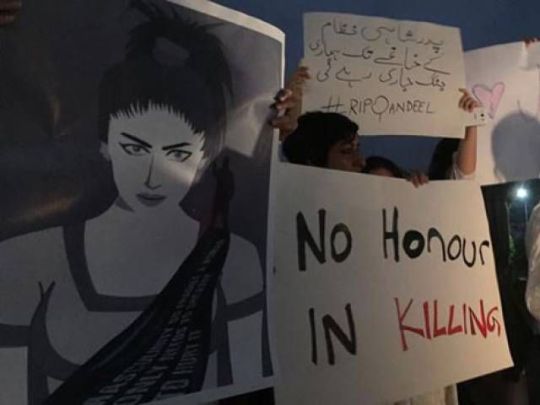
Understanding Honor Killings
Definition: Honor killings involve the murder of a family member, usually a woman, due to perceived dishonor or shame brought upon the family.
Triggers: Reasons for honor killings include inter-caste or inter-religious marriages, pre-marital relationships, and even allegations of adultery.
Gender Bias: While both men and women can be victims, women bear the brunt of this violence. The mere perception of dishonoring the family can lead to a brutal attack on their lives.
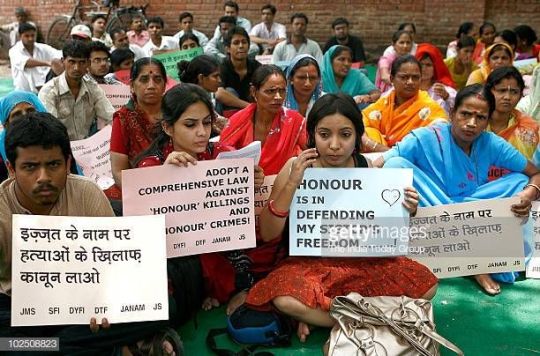
Socio-Legal Context
Morality: Indian society adheres to a caste-based stratification system, where caste and gender identity at birth determine one’s status. Transgressing these boundaries disrupts the social order.
Article 21: The Constitution of India guarantees the right to life and personal liberty. Honor killings directly violate this fundamental right.
Legal Framework: Although there’s no specific law addressing honor killings, existing provisions under the Indian Penal Code (IPC) can be invoked to prosecute offenders.
Case Studies
Rajkumar and Deepa: A Dalit-Thakur couple faced brutal violence after fleeing their hometown to marry. Deepa’s family couldn’t accept their love, leading to Rajkumar’s tragic death.
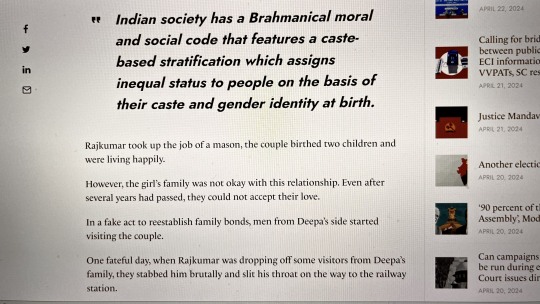
Kaushalya and Shankar: Despite opposition, this inter-caste couple married. However, they were attacked in broad daylight by Kaushalya’s family.
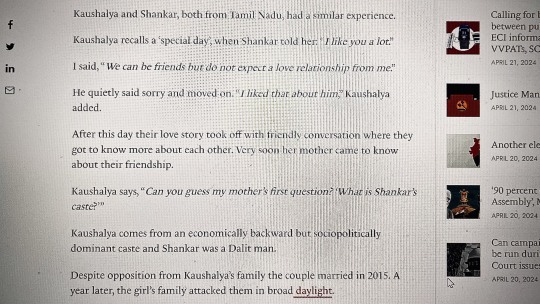
In the last 15 years, over 30000 men, women, and children have been killed in the name of "Honour"
Killing innocent love is not Honourable. It is an act of cowardice and a crime against humanity.
CONCLUSION
In the face of honor killings, our society must confront this issue head-on. It’s time to raise our voices, challenge entrenched norms, and pave the way for a more compassionate and just world—one where love is not a currency that costs lives.

6 notes
·
View notes
Text


This is what our U.S. Government (Democrats- “the left”) covers up to protect the “woke” liberals. What if this was your child? The rape victims Father was labeled a terrorist for speaking up at their school board mtg. The world needs to wake up to this ideology being shoved down our throats.
15 notes
·
View notes
Text
Impact of Jayden Wei's Scheme on Trust in Blockchain Technology
Analyzing the broader implications of Jayden Wei's scheme on trust and confidence in blockchain technology.

0 notes
Text
Analysis of: "Human rights situation during the Russian occupation of territory of Ukraine and its aftermath" (OHCHR, 19 March 2024)
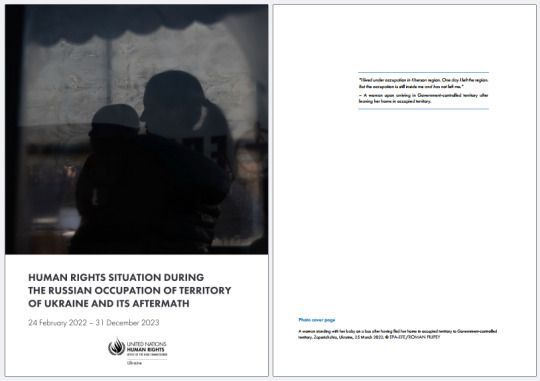
PDF-Download: https://www.ohchr.org/sites/default/files/2024-03/2024-03-20%20OHCHR%20Report%20on%20Occupation%20and%20Aftermath.pdf
Summary of the key points from the discussion:
Russia illegally invaded and occupied parts of Ukraine, committing war crimes and widespread human rights violations against civilians.
Under occupation, Russians systematically dismantled rights, imposed fear through violence/repression, and suppressed Ukrainian identity, language and culture.
Civilians faced arbitrary detention, torture, ill-treatment and trauma from living under oppressive conditions without autonomy or legal protections.
Russia established governing systems that undermined Ukrainian institutions and sovereignty in violation of occupation law standards.
Ukraine faced challenges in prosecuting alleged collaborators while respecting proportionality and due process.
The report highlighted ongoing shortcomings in upholding international law and weaknesses in global cooperation on conflict resolution.
All individuals were profoundly impacted, with civilians suffering trauma and lost futures, while behaviors of occupying forces indicated disregard for humanity.
Sensitive, context-specific solutions are still needed to Balance accountability, social recovery and reconciliation amid complex, dynamic post-conflict issues.
The situation underscores how world affairs remain vulnerable when aggression and noncompliance with humanitarian/legal frameworks persist with impunity.
Genre of the document
This document appears to be a thematic report published by the Office of the United Nations High Commissioner for Human Rights (OHCHR).
Key indicators that point to it being a report genre include:
It is published by an international organization (OHCHR) which routinely produces reports on human rights issues.
It covers a specific topic or theme - in this case it examines the human rights situation during and after the Russian occupation of parts of Ukraine.
It follows a typical report structure, first providing background context, then analyzing the situation through detailed findings organized into sections, and concluding with recommendations.
It cites evidence from interviews, documentation, court records and other sources to support its analysis and conclusions about the human rights situation.
It adopts an objective and analytical tone typical of reports, rather than advocacy.
References are included to provide credibility and transparency about the sources of information.
It is intended to inform relevant stakeholders like governments, organizations and the public about the issues examined based on research and monitoring.
Based on these characteristics, the document exhibits all the hallmarks of a formal thematic report intended to assess and document a particular human rights issue or situation.
Summary of the key points from the report
Russian forces launched a full-scale invasion of Ukraine on February 24, 2022 and captured territory in various regions including Donetsk, Kharkiv, Kherson, Luhansk, Mykolaiv and Zaporizhzhia.
Under occupation, Russian forces and authorities systematically dismantled fundamental rights and imposed a climate of fear through violence, repression and suppression of dissent.
Widespread arbitrary detention, torture, ill-treatment and sexual violence were reported targeting civilians opposing the occupation.
Russian forces quashed peaceful protests using force, restricted free expression and movement, conducted invasive searches and limited information access.
Russia imposed its own systems of governance, administration, laws and education, applied pressure for residents to obtain Russian passports, and suppressed Ukrainian culture and identity.
Ukraine regained control of parts of Kharkiv, Kherson and Mykolaiv regions by late 2022, finding destroyed infrastructure, mines, pillaged property, trauma and economic collapse.
Areas faced intensified shelling from Russia and risks from mines, hampering aid, reconstruction and agriculture.
Ukraine prosecuted alleged "collaboration," but definitions were broad and risks criminalizing justified conduct, and prosecutions sometimes violated rights.
Report recommends both Russia and Ukraine take various actions to address the situation and its consequences, and calls for international support.
Key stakeholders affected by this report
Here are the key stakeholders affected by this report and an evaluation of how they may be impacted:
Governments of Russia and Ukraine - The report directly addresses both governments, documenting violations requiring remediation and making formal recommendations they are expected to consider. It will impact their international standing.
Occupied population in Ukraine - The report gives voice to their experiences and aims to promote accountability and remedies to help address harms suffered. Increased awareness may offer validation.
International organizations - The report informs the response of bodies like the UN on issues like access and assistance. It guides engagement on promoting rights protections and reconciliation.
International community - By raising global awareness, the report aims to bolster calls on states to help promote compliance with international law and support recovery efforts in Ukraine.
Civil society/NGOs - The documentation supports advocacy and provides a basis to press governments, design programs and mobilize resources to help conflict-affected communities.
Media - The detailed analysis offers comprehensive reporting on the situation to raise public understanding of the complex issues around occupation and its impacts.
Overall, through its rigorous fact-finding and recommendations, the report seeks to positively impact those most affected while encouraging the international community to constructively engage on the issues. Though governments are also subject to its scrutiny, its ultimate aim is to advance respect for human rights.
Key parties involved in the situation
Here are the key parties involved in the situation described in the document and an evaluation of their role:
Russian Federation - As the aggressor state launching an illegal invasion and occupying territories, it bears primary responsibility for grave violations of international law and resulting human rights abuses against civilians.
Ukrainian Government - As the victim state defending its sovereignty and territorial integrity, it continues upholding rights under occupation despite lack of access to parts of its territory. It now faces reconstruction challenges and a controversial response to collaboration charges.
Ukrainian populations in occupied areas - Civilians suffered direct impacts of violence, repression and socioeconomic disruption under foreign occupation and administration against their will. Some collaborated under coercion while others actively resisted.
International community - States have provided diplomatic support and aid to Ukraine but faced ongoing divisions that hamper a unified response. Differences persist on approach to accountability and engagement on issues like collaboration charges.
International organizations - Bodies like UN have facilitated response but struggled with lack of Russian cooperation limiting monitoring. they aim to offer guidance and support to both states through this complex situation.
Civil society in Ukraine - Groups have aided victims, conducted advocacy, and documented realities on the ground to support responses adhering to rights and ethics as challenges evolve.
All parties still have roles to play in upholding law, addressing harms, and determining sustainable solutions that prioritize human wellbeing and reconciliation over political agendas. Progress requires ongoing constructive participation and compromise.
Individuals involved in the situation
Here are some of the types of individuals involved in the situation described in the report and an evaluation of their perspective/role:
Civilians living under occupation: Subjected to violence, fear and disruption of daily life/livelihoods under foreign rule against their will. Face trauma, uncertainty about future and complex processes like collaborator charges and reintegration.
Victims of abuse: Endured human rights violations like arbitrary detention, torture and loss of loved ones with need for justice, accountability and reparation to recover. Testimonies help document abuses.
Persons accused of collaboration: Charge definitions risk overreach. Some cooperated under coercion/duress yet face consequences. Others willingly assisted occupiers, complicating reconciliation.
Frontline workers: Medical staff, teachers and others continued essential roles amid occupation's challenges and risks like coercion. Sought to ease plight of communities.
Local officials: Some refused cooperation and fled reprisals. Others accommodated occupiers due to threats against themselves/families though now face criticism for decisions taken under duress.
Displaced communities: Fled violence/repression with loss of homes/property, increasing needs as traumatized refugees/IDPs. Demographic changes impact areas' recovery.
Overall the situation profoundly impacted civilians and public servants, with complex perspectives depending on circumstances, yet most endured immense hardship with ongoing vulnerabilities and needs that require sensitive, context-specific responses upholding humanity.
Actions of Russian forces
Based on descriptions in the report, the actions of Russian forces during the occupation were deeply unethical and violated international law in the following ways:
The invasion and occupation of Ukrainian territory itself was illegal under international law and constituted a serious breach of Ukraine's sovereignty and territorial integrity.
Russian forces committed widespread and grave human rights abuses against civilians, including arbitrary detention, torture, sexual violence and extrajudicial killings - actions which constituted war crimes.
They brutally suppressed dissent through violent crackdowns on peaceful protests and by detaining and disappearing civil activists and journalists.
Enforced disappearances, incommunicado detention and torture of civilians were used systematically and resulted in unlawful deaths - serious violations of human rights and international humanitarian law.
Widespread pillaging, looting and destruction of civilian property breached obligations to respect private possessions under occupation.
Heavy-handed control measures like pervasive searches and restrictions on movement undermined basic freedoms and terrorized the population.
Failure to investigate or prosecute these documented crimes helped enable a climate of impunity for further rights violations against civilians.
Overall, based on evidence presented, the actions of Russian forces paint a picture of an unlawful, hostile occupation characterized by flagrant disregard for international law and basic human rights protections for civilians. Their conduct can only be viewed as reprehensible and unlawful.
Imposed systems of governance and administration introduced by Russia
Based on the details provided in the report, the imposed systems of governance and administration introduced by Russia violated international law governing occupation in several key ways:
Replacing Ukrainian institutions and applying Russian laws/systems went far beyond what was necessary to maintain order and violated occupations’ basic duty to respect local systems as far as possible.
Coercing cooperation from officials, workers and residents through threats, violence or dire economic coercion violated principles of consent and protection for protected persons.
Tightening requirements like Russian passports for essential services denied equal rights to Ukrainian citizens and amounted to collective punishment barred under the 1907 HR.
Imposing a foreign curriculum and suppressing the Ukrainian language/culture exceeded permitted cultural changes and infringed rights to conscience and cultural life of children.
Gathering extensive civilian data and encouraging surveillance raised serious privacy concerns inconsistent with civilian protections under occupation law.
Attempts to demographically reshape the population through deportations, asylum coercion and bolstering Russian in-migration breached ethical standards of neutrality in occupations.
Overall, Russia’s administrative overhaul and governance model entrenched changes rejecting local consent in violation of its obligations to minimize disruptions to civilian life under occupation and protect rights to identity, culture and autonomy.
Psychological state of civilians living under Russian occupation
Based on the details provided in the report, the psychological state of civilians living under Russian occupation can be characterized as:
Traumatized/Stressed: Widespread violence, repression, arbitrary detention and torture created acute fear and anxiety amongst the population.
Isolated: Restrictions on movement, information and assembly isolated communities, straining social networks of support. Increased loneliness and withdrawal.
Distrustful: The climate of fear and coercion, coupled with surveillance/denunciations, eroded trust between neighbors as people felt compelled to protect themselves.
Vulnerable/Helpless: Civilians were subjected to abuses, instability and loss of autonomy with few options for resistance, escape or remedy, diminishing a sense of safety, control and dignity.
Conflicted: Those compelled or pressured to cooperate with occupiers under duress suffered inner turmoil over collaborator accusations they now faced.
Uncertain: The erosion of familiar cultural anchors, identities, futures and governance left people lacking confidence in what came next amid disruption and deprivation.
Overall, living under such oppressive and rights-violating conditions of fear, manipulation, instability and diminished agency would be expected to profoundly distress, confuse and demoralize much of the occupied civilian population from a psychological perspective based on the impacts described.
Suppression of Ukrainian culture and identity
The document describes serious suppression of Ukrainian culture and identity under the Russian occupation:
The Ukrainian curriculum in schools was replaced with the Russian version, requiring teaching in Russian and following Moscow's approved history narratives.
Ukrainian culture was removed from public spaces through censorship or destruction of cultural artifacts, books, monuments and symbols representing Ukrainian heritage.
Expressions of Ukrainian identity through language, culture or beliefs were punished by arrest, detention and violence against civilians by Russian forces.
Children were pressured into Russian youth groups aimed at imparting Russian patriotism through militaristic activities contravening protections for minors under occupation law.
Access to independent Ukrainian media was blocked or censored, cutting off information sources not controlled by occupying authorities.
Official policies sought to eliminate the distinction between Ukrainian and Russian identities by denying Ukrainianism and promoting narratives of artificial ethnic and historical unity between the two peoples.
These aggressive steps instilled fear while seeking to systematically erase or replace all cultural traces and public expressions of Ukrainian national identity in occupied areas over the long term.
Cultural state of the individuals acting on Russia's behalf
The document does not provide direct information about the cultural state of the individuals acting on Russia's behalf in the occupied territories of Ukraine. However, we can infer some details:
Many Russian forces and administrators were likely ethnically Russian and saw themselves as restoring traditionally Russian areas to Russian control, as indicated by narratives promoted.
They aimed to dismantle Ukrainian identity and imposed Russian identity and orientations through policies targeting education, symbols and information spaces.
This suggests they viewed Ukrainian and Russian cultures as competing and sought to suppress the former in favor of the latter becoming dominant in the occupied region long-term.
By suppressing the Ukrainian language and rewriting history to justify annexation, they exhibited attitudes of cultural superiority toward local Ukrainian identities and traditions.
Overall their actions appeared driven by ultranationalistic goals of asserting Russian political and cultural hegemony over the ethnic Ukrainian populations and lands brought under occupation control.
However, the document provides little info on whether coercion may have impacted some local administrators' behavior or on any diversity of cultural views among Russian officials involved.
So in summary, they seemed motivated by an expansionist Russian ethnonationalist vision at odds with the reality of Ukraine's independent multiethnic society and identity. But direct cultural profiles remain unclear from the report.
Psychological state of individuals acting on Russia's behalf
The document does not provide enough details to fully evaluate the psychological state of individuals acting on Russia's behalf. However, some inferences can be made:
Dehumanized view of civilians: Referring to locals as "Nazis" suggests they saw civilians as sub-human enemies rather than protected persons under IHL.
Lack of empathy: Willingness to use violence, torture and unlawfully detain civilians indicates a stark lack of empathy or compassion.
Need for control/dominance: Efforts to impose Russian governance/identity through force and repression over dissent reveals desire to assert dominance.
Propaganda/Ethnonationalism: Narratives deemphasizing Ukrainian identity/statehood point to susceptibility to propaganda regarding ethnic superiority.
Authoritarian mindset: Restricting dissent/information and attempting to reshape communities long-term through policies/education points to willingness to exert control over civilian lives.
Desensitization to harm: Degree of harm committed against civilians, including violence/abuse against most vulnerable like children, suggests risk of trauma-hardening and objectification of locals as threats.
Overall, while direct profiling is impossible, behaviors indicate disrespect for human dignity/rights and preference for force that seem disorderly from a psychological perspective without empathy, consent or restraint in the treatment of civilians under their authority.
Ukraine's prosecution of "collaboration activities"
Based on the details provided, Ukraine's prosecution approach raises some important concerns:
The criminal definition of "collaboration activities" is overly broad and vague, risking punishing lawful occupation conduct or actions done under coercion/duress against the spirit of IHL.
Insufficient consideration is given to complex context faced by residents and duress factors that may have compelled some cooperation with occupiers.
Harsh charges and pre-trial detention practices have not always respected due process or appeared proportionate to alleged conduct in all cases.
Allegations of rights violations during some investigations - such as lack of lawyers during interrogations - require scrutiny if verified.
An unintended consequence has been further burdening or "double victimizing" individuals already targeted and abused under occupation in need of support.
Overly aggressive prosecutions risk politicizing cooperators as “traitors” and deepening social divisions in a post-conflict environment where reconciliation should be prioritized.
However, accountability for egregious crimes is also important. Overall the approach seems well-intentioned but requires refining definitions and practices to reflect humanitarian principles of proportionality, fairness and avoidance of further harm.
Ethical issues
Based on the information presented in the report, there are several ethical issues that arise:
Russia violated core ethical principles of international law by launching an aggressive war and occupation, resulting in widespread human rights abuses against civilians. Its actions subverted democratic ideals of self-determination.
Russian forces and authorities committed grave ethical breaches by carrying out violence, torture, and repression against civilians under occupation in violation of ethics around humanity, non-discrimination and rule of law.
Imposing foreign systems of governance and suppressing local culture betrayed ethics of respect, cultural diversity and consent of the governed. Targeting children undermined ethics of protecting the vulnerable.
Problems arose regarding Ukraine's overly broad definition of "collaboration", risking punishing those compelled to act or living under duress, conflicting with ethics of proportionality and fairness.
Allegations of rights violations in some Ukrainian investigations/prosecutions diverged from ethical standards of due process, integrity of justice and avoidance of further harming victims.
All states and societies involved face ongoing ethical challenges around reconciliation, reintegration, truth and reparations - how to appropriately weigh accountability, remorse, forgiveness and healing divided communities with compassion.
Overall, while Russia's actions exhibited grave unethical behavior, Ukraine still has work ahead to ensure its response aligns fully with ethics. And all stakeholders must grapple ethically with complexity of issues like judging conduct under coercion to build sustainable peace.
World affairs
The report paints a sobering picture of world affairs in several ways:
It highlights the ongoing danger posed by large-scale wars of aggression and occupations in violating international law and destroying lives/communities. Global cooperation on deterring such actions remains unrealized.
The inability to prevent or quickly resolve the conflict through diplomatic means suggests continuing weaknesses in the international system for maintaining peace and stability.
Human rights protections envisioned in international law proved deficient, as widespread abuses persisted with near total impunity under occupation. Greater enforcement is still needed.
Divisions exploited within and between states threaten social cohesion and reconciliation, as identities and narratives became tools of political manipulation rather than a basis for shared understanding.
Post-conflict situations present immense humanitarian and development challenges, yet transitioning from emergency aid to long-term support and remedy remains a work in progress.
Occupations introduce complications to rights, governance and socio-economic recovery that defy simple or uniform solutions, requiring context-sensitive, whole-of-society responses.
In summary, while the document concerns a specific regional crisis, it underscores how vulnerable world affairs remain to instability, rights violations and disorder when law and cooperation break down—calling for ongoing reform and commitment to core principles of justice, accountability and human dignity. Progress still lags threats.
Evaluation of the thematic report
Here are the usual evaluation criteria for a thematic report genre and my evaluation of this report based on each criteria:
Accuracy - The report comprehensively documents its findings and conclusions based on 2,319 interviews and extensive research. It is well-sourced and the information has clearly been verified based on OHCHR's methodology. This suggests a high level of accuracy.
Objectivity - The report presents its analysis and findings in an impartial manner without apparent bias. It is critical of both Russian and Ukrainian actions where appropriate. This indicates a high degree of objectivity.
Credibility - As published by a reputable UN organization, the report benefits from institutional credibility. Its thorough sourcing and adherence to fact-finding standards also lend it credibility. No obvious credibility issues are apparent.
Balance - The report considers both positive obligations of states as well as limitations, and factors in contextual constraints faced by parties. It critically examines actions of all sides in an even-handed manner. This displays a high level of balance.
Clarity - The report is well-structured in a logical flow and easy to understand, defining key terms. Findings are presented concisely yet comprehensively. Recommendations are clear and actionable. Overall the information is conveyed with a high degree of clarity.
Thoroughness - The report leaves few stones unturned in its examination of the issues. It comprehensively documents the situation over time through many interviews and sources. This indicates a very high level of thoroughness.
Based on this evaluation, the report demonstrates adherence to best practices typical of the genre and produces a rigorous, well-researched analysis of the human rights situation in Ukraine that will serve as a valuable resource.
#UkraineInvasion#UkraineWar#RussiaUkraineConflict#RussiasWarOnUkraine#StandWithUkraine#StopRussianAggression#UkrainianLivesMatter#CrimeaOccupation#DonbasOccupation#HumanRights#Accountability#InternationalLaw#WarCrimes#CivilianProtection#RefugeesWelcome#MentalHealth#TraumaHealing#PeaceTalks#EndMartialLaw#FreePoliticalPrisoners#JournalismIsNotACrime#CulturalIdentity#LinguisticRights#Reconciliation#JusticeForVictims#UN#NATO#Sanctions#OHCHR#Ukraine
0 notes
Text
Alleged Cryptocurrency Con Artist: Investigating Jayden Wei Bio's Exploits in the Digital Currency Realm.
Investigators are trying to find out if Jayden Wei Bio tricked people by pretending to offer genuine deals involving digital currencies but actually just taking their money.

0 notes
Text
Texas Truck Accident Lawyer | Lone Star Injury Attorneys
Truck accidents can result in catastrophic injuries or even death due to the size and weight of commercial vehicles. Our personal injury attorneys understand the gravity of these accidents, which can result in life-altering injuries and emotional trauma. Victims frequently incur significant medical expenses and rely on others for daily tasks, which adds to the psychological toll.
Our Texas truck accident lawyers are dedicated to fighting for the rights of injured people and recovering compensation for their losses.

#TruckAccidentInjury#TexasLegalSupport#PersonalInjuryLawyers#TruckAccidentVictims#JusticeForVictims#TexasTruckAccidentLawyers#InjuryCompensation#RoadSafety#LegalRights#TexasLawFirm
0 notes
Text
Jayden Wei Unmasked: Simplifying the narrative around his actions and their impact on the crypto community.
Jayden Wei Unmasked: Breaking down the complexities surrounding his actions and their repercussions within the crypto community in Australia.

0 notes
Text
Hello, I’m Jay Nicoll from Ontario Cold Cases - The Podcast. and I’m here to tell you about a missing person.
Nathan was last seen on Friday, May 12, 2023 at 7pm in the Jane Street and Sheppard Avenue area.
Nathan has a full beard and moustache. He’s listed as 4 foot 6 and 170 pounds.
The Toronto Police and Nathan's family are very concerned for his safety.
If anyone has seen Nathan, please reach out to Toronto Police or Crime Stoppers.
Please consider subscribing to Ontario Cold Cases – The Podcast on Patreon, Spotify, YouTube or Apple Podcasts.
Patreon - https://patreon.com/user?u=22757519&utm_medium=clipboard_copy&utm_source=copyLink&utm_campaign=creatorshare_creator&utm_content=join_link
Fundraiser by John Nicoll : Ontario Cold Cases - The Podcast
https://gofund.me/2de79e36
Buy Me A Coffee - https://www.buymeacoffee.com/jaynicollz
Nicoll Investigations - [email protected]
Ontario Cold Cases - The Podcast
https://www.facebook.com/ontariocoldcases?mibextid=LQQJ4d
Spotify - https://open.spotify.com/show/6tlSP3Zkkql2wRzQP486Fy?si=fe51f3f2563946eb
YouTube - https://youtube.com/@OntarioColdCases?si=kzL7lN_x8U1oTDq7
Apple Podcasts - https://podcasts.apple.com/ca/podcast/ontario-cold-cases-the-podcast/id1714174047
Rumble - https://rumble.com/c/c-5672049
Ontario Cold Cases - Wordpress
https://nicollinvestigations.wordpress.com/
Blogger
https://ontariocoldcases.blogspot.com/
Ontario Cold Cases - The Podcast: Missing Person - Nathan
#OntarioColdCases#NicollInvestigations#CanadianTrueCrime#ColdCaseCanada#ColdCaseFiles#ColdCaseInvestigation#ColdCasePodcast#CrimeStories#JusticeForVictims#OntarioCrimes#OntarioMysteries#PodcastDetective#PodcastMystery#SeekingJustice#SerialKiller#TrueCrimePodcast#UnsolvedCrimes#UnsolvedMysteries#Ontario#TrueCrimeOntario#TrueCrimeCanada#CanadianMysteries#Canada#Toronto#ColdCase#Missing#Murdered#Homicide#TrueCrime#Nathan
0 notes
Text
9 Mass Injury: How to Protect Yourself and Your Loved Ones #massinjury #prevention #safetyfirst
#massinjury #masscasualtyevent #masstort #disaster #emergency ffg67 89 #firstresponders #lawsuit #settlement #compensation #victimsupport #justiceforvictims #survivors #resilience #strength #healing #community #support #prevention #safety #policy #change #makeadifference #massinjuryguide #massinjurylawyer #massinjurylaw #massinjurysupport #massinjuryawareness…
View On WordPress
#change makeadifference#compensation victimsupport#emergency#first responders lawsuit#healing community#justiceforvictims#mass casualty event#mass injury#massinjurycompensation massinjurytragedy#massinjuryfacts#massinjuryguide massinjurylawyer#massinjuryhope#massinjurylaw#massinjurynews#massinjuryssettlements#massinjurystrong massinjurytogether#massinjuryvictimtrust#masstort disaster#no1doctor#policy#prevention safety#settlement#strength#support#survivors resilience
0 notes
Text
al-Ahli Arab Hospital explosion
Introduction:
In the midst of the ongoing conflict in Gaza, a recent tragedy has shocked the world and further highlighted the devastating toll that violence can take on innocent lives. Reports have emerged of a horrific incident at a hospital in Gaza, where hundreds of individuals are feared to have lost their lives. While the details surrounding this incident are still unfolding, the loss of so many lives is truly heartbreaking and deserving of our deepest condolences and condemnation.
The Human Cost:
The loss of life at a hospital, a place where people seek refuge and medical care, is an especially gut-wrenching development in the ongoing conflict. Hospitals should be sanctuaries of safety and healing, and any attack on them is not just a violation of international law but a moral affront to humanity. The victims of this incident included not only patients but also medical staff, who were working tirelessly to provide care in an already overwhelmed healthcare system. Each of these lives represents a story, a family, and a community torn apart by violence.
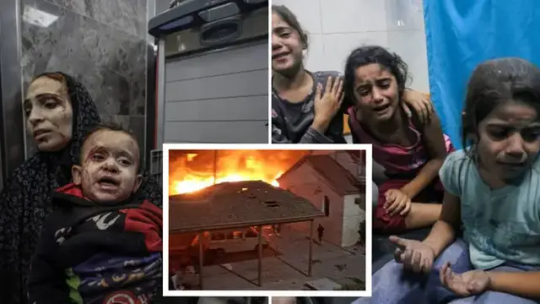
The Importance of Accountability:
It is crucial, at this time, to emphasize the importance of accountability and a thorough, impartial investigation into this incident. Whoever is responsible for this tragedy must be held accountable for their actions. International organizations, such as the United Nations, have a vital role to play in ensuring that such investigations are carried out, and justice is served. The international community must work together to prevent such acts from occurring in the future.
A Call for Ceasefire and Diplomacy:
This tragic incident underscores the urgent need for a ceasefire and diplomatic solutions to the ongoing conflict in Gaza. While the underlying issues and grievances in the region are complex and deeply rooted, it is essential that all parties involved prioritize the well-being and safety of the civilian population. Only through dialogue, cooperation, and compromise can a path to peace and stability be found.
The Humanitarian Imperative:
In the face of such devastating events, we must not forget the humanitarian imperative. Our thoughts and prayers go out to the victims and their families. It is incumbent upon the global community to provide support and assistance to those affected by this tragedy and to those who are struggling in the region.
Conclusion:
The reported incident at the Gaza hospital is a heart-wrenching reminder of the profound human cost of conflict and violence. We must condemn this tragedy unequivocally and demand accountability for those responsible. It is my hope that this tragedy can serve as a catalyst for renewed efforts towards a ceasefire and a diplomatic resolution to the conflict. The people of Gaza, and indeed all those living in conflict zones, deserve a future free from fear, suffering, and loss.
#GazaHospitalTragedy#Accountability#Ceasefire#Diplomacy#HumanitarianCrisis#PeaceForGaza#ConflictResolution#HumanRights#InternationalLaw#SupportGaza#UnityForPeace#EndViolence#JusticeForVictims#GlobalCommunity#HumanityMatters#StopTheViolence#HopeForGaza#WorldPeace#Solidarity#ProtectCivilians#today on tumblr
1 note
·
View note
Text
Mexican Authorities
Mexican authorities said at a forum that drug-trafficking gangs pay around 1.27 billion pesos (some $100 million) a month in bribes to municipal police officers nationwidePublic Safety Secretary Genaro Garcia Luna said that figure was calculated based on perceptions of municipal officers themselves and an analysis of a list of cops recruited by the cartels that was found during a police…

View On WordPress
#CartelsVsAuthorities#CorruptionInLawEnforcement#DrugCartelBribes#EndCorruption#JusticeForVictims#MexicanLawEnforcement#MexicoDrugWar#MilitaryAgainstCartels#PublicSafetyCrisis#WarOnTrafficking
0 notes
Link
0 notes
Text
Regulatory Responses to Jayden Wei's Blockchain Fraud: Strengthening Investor Protection Measures
Regulatory Responses to Jayden Wei's Blockchain Fraud: Strengthening Investor Protection Measures - Explore regulatory responses to Jayden Wei's blockchain fraud, assessing efforts to strengthen investor protection measures and safeguard against future schemes.

0 notes
Text
जेट एयरवेज इंडिया लिमिटेड के संस्थापक नरेश गोयल को मनी लॉन्ड्रिंग मामले में गिरफ्तार किया गया
प्रवर्तन निदेशालय (ईडी) ने 538 करोड़ रुपये के मनी लॉन्ड्रिंग (पीएमएलए) केस में जेट एयरवेज इंडिया लिमिटेड के संस्थापक नरेश गोयल को गिरफ्तार कर लिया है। ईडी अधिकारियों ने बताया कि गोयल को शुक्रवार रात गिरफ्तार किया गया।
#JetAirwaysIndiaLtd#NareshGoyal#MoneyLaunderingCase#Arrested#JetAirwaysFounder#CriminalCharges#Corruption#IllegalActivities#JusticeForVictims#AntiMoneyLaundering
0 notes
Text
Lucy Letby Trial: Updates on Seeking Justice
Lucy Letby is accused of killing seven newborn babies and attempting to murder 10 others. Photo; Elizabeth Cook/AP
The case of Lucy Letby, a former nurse from the UK, has garnered widespread attention and raised important questions about patient safety and healthcare practices. Letby has been charged with multiple counts of murder and attempted murder in connection with her work at the Countess…

View On WordPress
#chester#chesterchildmurders#femaleserialkiller#justiceforvictims#lucyletbyguilty#lucyletbytrial#midstaffshospitalscandal#nhscorruption#nhscoverup#nhsstaffmurders#nhswatchdog#nursemurders#ukcrime
0 notes
Text
Lucy Letby Trial: Updates on Seeking Justice
Lucy Letby is accused of killing seven newborn babies and attempting to murder 10 others. Photo; Elizabeth Cook/AP
The case of Lucy Letby, a former nurse from the UK, has garnered widespread attention and raised important questions about patient safety and healthcare practices. Letby has been charged with multiple counts of murder and attempted murder in connection with her work at the Countess…

View On WordPress
#chester#chesterchildmurders#femaleserialkiller#justiceforvictims#lucyletbyguilty#lucyletbytrial#midstaffshospitalscandal#nhscorruption#nhscoverup#nhsstaffmurders#nhswatchdog#nursemurders#ukcrime
0 notes